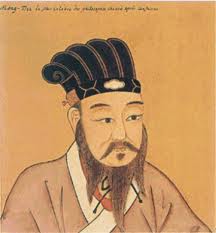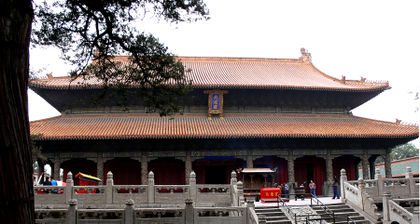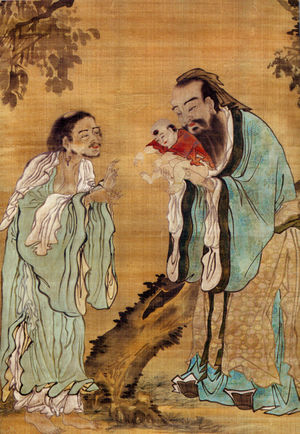Confucio

Confucio es el jerarca del Retiro Royal Teton y presta servicio en el segundo rayo de la sabiduría divina. Sucedió al Señor Lanto como jerarca del Retiro el 3 de julio de 1958.
Confucius’ legacy
Aunque ha tenido muchas encarnaciones de servicio a la luz, a Confucio se lo recuerda mejor por sus contribuciones a la forma de vida china. Conocido como K’ung Fu-tze («Filósofo K’ung» o «Maestro K’ung») por sus contemporáneos del siglo V a.C., estableció las bases para la unificación y administración del imperio chino que llegó más tarde. Como brillante filósofo social, económico, político y moral, Confucio puso las bases teóricas que permitieron a China convertirse en una de las civilizaciones más grandes de todos los tiempos. A pesar de la elevación y caída de las dinastías, el estado confuciano prevaleció; y, al final, mediante la expansión de la cultura china, sus ideas fueron aceptadas por toda Asia oriental. Pocas veces ha influido tanto un hombre en tanta gente por un período de tiempo tan grande.
Confucio es respetado como el instructor más grande de China y ha sido adorado como un gran bodhisattva, o Buda futuro. Él creía que el cielo se podía crear en la tierra mediante el ritual y la música. Sus seguidores llegaron a ser conocidos como los Caballeros de las Artes porque dominaron el tiro con arco, la poesía, las matemáticas, la historia, la danza, los rituales religiosos y la etiqueta.
Aunque generaciones posteriores malinterpretaron a Confucio y pensaron que se trataba de un estirado burócrata, Confucio tenía una profunda espiritualidad y visión. Por eso era tan práctico. Confucio enseñó que «el Sendero no puede ser abandonado ni por un instante. Si se pudiera abandonar, no sería el Sendero».Cite error: Invalid <ref> tag; refs with no name must have content A pesar del esfuerzo por eliminar sus enseñanzas, los dichos de Confucio como «las exigencias que hace un caballero son para consigo mismo; las que hace un hombre pequeño son para con los demás»Cite error: Invalid <ref> tag; refs with no name must have content y «los precavidos apenas yerran»Cite error: Invalid <ref> tag; refs with no name must have content, siguen siendo parte integral del pensamiento del pueblo chino.

Confucius’ life
Confucio nació en 551 a.C., una época de gran turbulencia y caos. Su padre, un anciano soldado, murió cuando Confucio tenía tres años de edad. Aunque su familia era pobre, se las arregló para ser un autodidacta. A los quince años de edad sabía que quería ser erudito. Trabajó como ayudante en el templo memorial del duque de Zhou, uno de los más grandes estadistas de la historia de China.
Quinientos años antes, el duque de Zhou, su padre, el rey Wen y su hermano, habían derrocado la corrupta dinastía Shang y habían establecido la dinastía Zhou. Él trajo un conocimiento nuevo de Dios y del gobierno divino al pueblo chino. «Sólo me preocupa el Cielo y el pueblo»Cite error: Invalid <ref> tag; refs with no name must have content, había dicho.
Confucio creía que el duque de Zhou le enseñaba en sueños por la noche. De hecho, Confucio afirmó que él mismo no era un innovador, sólo traía de nuevo el estándar y los principios del duque de Zhou. (El duque de Zhou fue una encarnación del Señor Lanto y se cree que Confucio estuvo encarnado en la época del duque de Zhou y que le ayudó a aplicar sus ideales.)

Inspirado por el duque de Zhou, Confucio editó los seis clásicos chinos, que habían sido escritos por el rey Wen. Se trataba del Libro de Poesía, el Libro de Ritos, el Libro de Historia, el Libro de Cambio (I Ching), el Libro de Documentos y el Libro de Música. El Libro de Música, desgraciadamente, se ha perdido por completo.
Today Confucius has a reputation for being stiff and reserved. But he was not without sensitivity. The story is told that he was once so moved by a performance of ancient music that he remained in a stupor for three months. When he finally came out of the trance, he said, “I never imagined that music could be so sublime.”[1]
We do not know much about Confucius’ life. He was married when he was nineteen and had a son and a daughter. He studied under various teachers and eventually gathered a group of students around him. For a time, he held a job as justice minister but was forced to abandon it and go into exile. Although Confucius had seventy-two disciples and more than three thousand students, he never realized his dream of becoming a prominent ruler in China.
During this time, the Chou dynasty was on the verge of collapse. The Chou government had degenerated into chaos, and brutal warlords continually fought with each other. “Confucius was the first to formulate a systematic response to this crisis in values,” writes Robert Eno, scholar of Chinese thought. “And the depth of his achievement is reflected by the fact that China’s first philosopher remained throughout its history its leading philosopher.”[2]
Confucius believed that ritual, or li, could transform one’s identity, one’s mind, one’s very being. “The program of study begins with the chanting of texts and ends with the study of ritual li,” Confucius explained. “Its significance is that one begins by becoming a gentleman and ends by becoming a Sage.”[3] Through disciplined cultivation of li, one attained jen, which Eno describes as “the selfless ethical responsiveness to others.”[4]
Although Confucius traveled throughout China, he never found a suitable job in the government. He felt like a failure and started to lament: “Extreme indeed is my decline. It’s been a long time since I dreamt about the Duke of Chou.”[5]
Confucius did not realize it at the time, but his spirituality was far more powerful than his resumé. He wandered about looking for work, but what he was really doing was anchoring his spiritual flame of wisdom in every corner of China. That flame inspired and sustained Chinese culture for many centuries.

His service today
As an ascended master, Confucius still dreams of making a heaven on earth through divine government. While he has not been able to work this dream in China, he sees himself as the grandfather of America. With practical wisdom and deep love, he inspires and guides his disciples who have embodied in the United States. Lanto explains that the practical side of the culture of America comes from the causal body of Confucius.
The ascended master Confucius has a profound understanding of family as the vital unit for building community and a new society in the Aquarian age. He shows us how to take etheric patterns and use them in tangible ways to improve our everyday lives—patterns of self-reliance in God, of the sacred family and of God-government. We tie into the etheric patterns and precipitate the etheric ideals through beauty, harmony and order in the physical octave. This is why the flame of precipitation is the main focus of Confucius’ Royal Teton Retreat. This flame is Chinese green in color, tinged with gold, and it burns on the main altar of the Retreat.
Confucius wants us to regard him as our loving and supportive grandfather. And like a grandfather, he also desires to pass on his dreams to us that we might fulfill them in his name. He longs to build a society on the foundation of love, wisdom and the will of God in the individual and in the family.
In 1976, Confucius said that many souls from ancient China have reembodied in America. He called them “the quiet Buddhic souls, the diligent ones,” the ones who have a spiritual mission to lay the foundation of the family in America. He points out that they understand the “basic loyalty of the family, the code of ethics, the gentleness, the sweetness and the desire for learning as the means to God-awareness.”
Furthermore, Confucius said, “They have come for an embodiment that their wisdom might be fired with freedom, that they might assist America” as she enters the twenty-first century. Their aim is to turn around a “false materialism” and to manifest instead “an etherealization, a spirituality, a conquering of self, of society and of the energies of time and space.”
Confucius is very much concerned with the affairs of civilization and with the destiny of America:
I am concerned on the one hand with the activities of the masculine ray as that ray has been perverted in China today and as its perversion has also led to the perversion of the feminine ray and the manifestation of the family.
I have seen the corruption in government. It is the same corruption that I witnessed twenty-five hundred years ago—the same corruption, mind you, the same corruptible ones. For the lifestreams who are focusing the energies for the disintegration of the light and of the golden age of China today are the lifestreams who thwarted the cosmic purpose of the Virgin thousands of years ago when my feet touched the earth and the streams of that beloved land of Chin.
I have noticed also that those who are the corruptible ones who have corrupted Saint Germain’s promise for America have come again and again. It is they who were the rats in the granary of Rome and Greece, India, the Middle East. There are always the betrayers.[6]
Confucius has said:
It is only cosmic justice that a balance should be made for the expenditure of every ounce of energy. Through the aeons and aeons of creation, this great law has never been violated with impunity. And those who think they can violate divine statutes have quickly found out upon the cosmic screen of life that the scales of divine justice do act, and that they act wisely and well.[7]
Notas
Mark L. Prophet y Elizabeth Clare Prophet, Los Maestros y sus Retiros, Volumen 1, “Confucio”.
- ↑ Confucius, Analects, 7:13, trans. James Legge.
- ↑ Robert Eno, The Confucian Creation of Heaven: Philosophy and the Defense of Ritual Mastery (Albany: State University of New York Press, 1990), p. 2.
- ↑ Ibid., p. 3.
- ↑ Ibid., p. 5.
- ↑ Confucius, Analects, 7:5.
- ↑ Confucius, “The Golden Light of the Golden Age of China,” June 13, 1976.
- ↑ Confucius, July 3, 1962.
